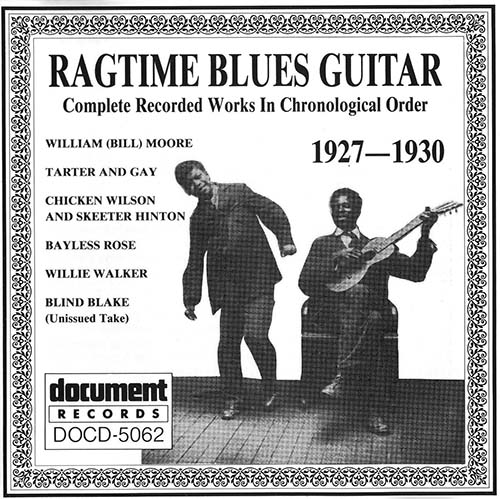Abridged from this album’s original booklet notes. Document strives to preserve and present each artist’s oeuvre in a concise, logical format that will make it available for further enjoyment and study for many years to come. Inevitably, however, some items do turn up and become available to Document after (or perhaps even because) the major alcum issue is released. It is only then that some collectors realize what rare and unusual items they already have in their collections, and they make them available for Document to share with the larger community. This issue, then, acts as a clearing house to preserve and expand on what has previously been available, and also can serve as a sampler of artists that have been featured. These additional items fall into several main categories. The Rev. D. C. Rice test pressing was one I had a dub of for some ten years, but I realized only in hindsight that it was not generally known to exist. When I sent it to Document, it turned out that technical limitations (absolute album playing time) precluded its earlier use in any case, but this is a case of better late than never. I think it was Bob Dixon who pointed out this fact of life for the compiler; as soon as the work is completed as much and as well as possible, in come the corrections and additions to keep him humble and constantly on the lookout for more. Some of these are items that have only been found in the last year or so. One of these Big Bill’s is a case in point, having been picked up in a lot that was brought in “off the street” for disposal. Richard Hite sold the 78 to Pete Wielan who made it available. Mike Kirsling has made available items that he found in the great Paramount test lot of several years ago, but which he retained. Now they will be available. Several items have been tracked down via the Rarest 78’s column in 78 Quarterly. Those we’ve been able to contact have been most generous and forthcoming to help make this (and, indeed, the whole series in general) as complete and good sounding as it is. As for the question of alternate takes, Document has been including them when they are aurally different. The Charley Patton -2 included here is an exception – not noticeably different to our ears, but a better copy in any case. Some of these alternates come to our attention aurally, as in the case of Memphis Minnie‘s Reachin’ Pete, of which only one take was thought to exist. So we know for sure that some people at least listen to these issues with intense concentration. No doubt there are interesting stories behind each item presented here, but here are included the newly found, newly recognized, and newly offered items and the background of only a few of them. In conclusion, we dedicate this issue to you, the listener, who makes this task of retrieval, preservation and presentation such a labor of love for us all. DOCD-5150
Tracklist :
1 Blind Blake– Early Morning Blues (3057-2) 2:57
2 Blind Lemon Jefferson– Lock Step Blues (20750) 3:05
3 Blind Lemon Jefferson– Hangman's Blues (20751-2) 3:04
4 George "Bullet" Williams– Frisco Leaving Birmingham (Take 3) 2:52
5 Bessie Tucker– My Man Has Quit Me (Take 2) 3:08
Piano – K.D. Johnson
6 Memphis Jug Band– Stealin' Stealin' (Take 3) 3:07
Vocals [Group Vcl] – Memphis Jug Band
7 Willie Baker– Weak-Minded Woman (14782 - Test) 3:04
8 Rev. D.C. Rice– Will They Welcome Me There? (Test) 3:17
Mandolin – Unknown Artist
Piano – Unknown Artist
Tambourine – Unknown Artist
Triangle – Unknown Artist
Trombone – Unknown Artist
Trumpet – Unknown Artist
9 Charlie Spand– Levee Camp Man (Breakdown) (Take 6 - Test) 1:31
10 Charlie Spand– Mississippi Blues (Take V6 - Test) 2:49
11 Robert Peeples– Worry Blues (Test) 2:39
12 Charley Patton– I Shall Not Be Moved (Take 2) 3:02
13 Big Bill– Bow Leg Baby 2:38
Piano – Georgia Tom Dorsey
14 Frank Brasswell– Mountain Jack Blues (16575) 2:26
Piano – Unknown Artist
15 Memphis Minnie– Memphis Minnie-Jitis Blues (Take B) 3:15
Guitar – Kansas Joe McCoy
16 Kansas City Kitty & Georgia Tom– Do It Some More 3:11
17 Kansas City Kitty & Georgia Tom– Knife Man Blues 3:11
18 Bo Carter– New Auto Blues 3:02
19 Big Bill– Worried In Mind Blues 3:00
20 Joe McCoy– Meat Cutter Blues (Alternate Take) 3:08
Guitar [Possibly] – Charlie McCoy
21 Joe McCoy– What's The Matter With You? 2:55
Piano – Jimmie Gordon
22 Memphis Minnie– Reachin' Pete (Take B) 3:10
23 Kokomo Arnold– Milk Cow Blues – No. 5 (Test) 2:44
24 Memphis Minnie– Running And Dodging Blues (Take 2 - Test) 2:43
Bass [String Bass, Probably] – Ransom Knowling
Clarinet – Arnett Nelson
Piano – Blind John Davis
25 Little Buddy Doyle– Slick Capers Blues (Test) 2:35
Harmonica [Probably] – Walter Horton
26 Lonnie Johnson– The Victim Of Love 3:10
Bass [String Bass] – Ransom Knowling
Piano – Blind John Davis



























.jpg)
.jpg)




